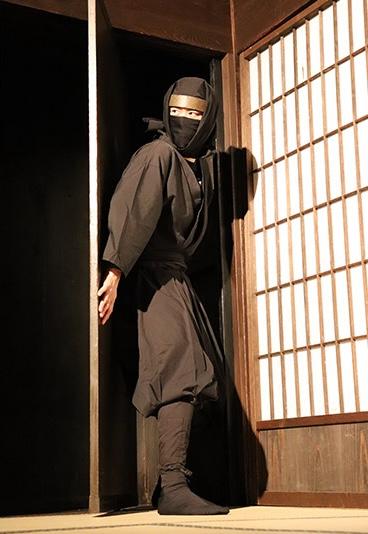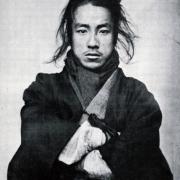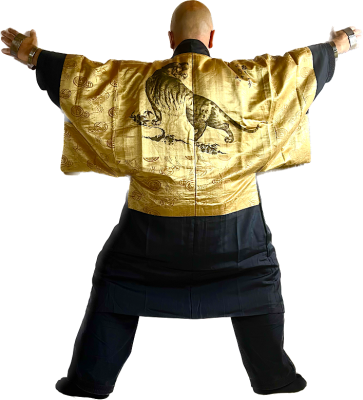Complete Guide to Choosing and Buying Quality Tabi for Ninjutsu
How to Choose and Where to Buy Quality Tabi for Ninjutsu ?
Introduction
 Ninjutsu, the ancient martial art practiced by the ninjas, requires specific equipment to ensure effective and safe training. Among these essentials, tabi, traditional Japanese footwear, play a crucial role. Whether for indoor training sessions or intensive outdoor practices with jikatabi, the quality of the tabi can greatly influence the practitioner's experience. But where can you find high-quality tabi that meet the standards of Bujinkan, Genbukan, and Jinenkan?
Ninjutsu, the ancient martial art practiced by the ninjas, requires specific equipment to ensure effective and safe training. Among these essentials, tabi, traditional Japanese footwear, play a crucial role. Whether for indoor training sessions or intensive outdoor practices with jikatabi, the quality of the tabi can greatly influence the practitioner's experience. But where can you find high-quality tabi that meet the standards of Bujinkan, Genbukan, and Jinenkan?
This is where NinjutsuShop.com, your specialized online store for high-quality ninjutsu equipment, comes in. Based in Japan, our store offers a wide selection of black and indigo blue tabi, available with brass fastenings called kohaze or velcro straps for quick adjustments. In this guide, we will explore why and how to choose the right tabi for your practice and why NinjutsuShop.com is the best option for purchasing them.
Why Choose Quality Tabi for Ninjutsu?
Comfort and Performance
High-quality tabi are essential for providing the comfort and support needed during rigorous ninjutsu training. Properly fitted tabi with well-crafted soles enhance agility, balance, and precision in movements. This contributes to better performance and reduces the risk of injuries, allowing practitioners to focus on mastering their techniques without discomfort.
Durability and Longevity
The durability of your tabi is crucial, especially for those who train intensively, both indoors and outdoors. Quality tabi made from robust materials withstand repeated use and the demands of varied training surfaces. Investing in durable tabi ensures they maintain their shape and functionality over time, providing a reliable training companion that won’t need frequent replacements.
Authenticity and Tradition
In ninjutsu, staying true to tradition is important. Black and indigo blue tabi are the preferred colors, maintaining a connection to the historical roots of the practice. The use of traditional kohaze brass fastenings or modern velcro straps reflects an adherence to both the authenticity and practicality required in modern martial arts. Choosing tabi that align with these traditional aspects enriches the training experience and respects the legacy of ninjutsu.
Types of Tabi Available
Indoor Tabi
Indoor tabi are specifically designed for use on smooth surfaces such as tatami mats or dojo floors. Made from soft, high-quality cotton, they offer excellent comfort and breathability. These tabi typically have thin soles that allow for better ground contact, enhancing movement control and perception. The brass fastenings, known as kohaze, ensure a secure and customized fit, while versions with velcro straps provide a practical alternative for quick and easy wear.
Jikatabi for Outdoor Use
Jikatabi are designed for outdoor training and have unique features that distinguish them from indoor tabi. They are equipped with thick, sturdy soles, often made of rubber, that provide better grip and protection on uneven surfaces. Jikatabi are perfect for outdoor practice and rough terrain, allowing practitioners to move with agility and safety. These models can also feature kohaze or velcro closures, depending on the user’s preference for tradition or modern convenience.
Materials Used
Quality tabi and jikatabi are made from various materials, each offering its own benefits. Cotton is commonly used for indoor tabi due to its softness and breathability, while more durable fabric blends or leather can be used for jikatabi to ensure better resistance to outdoor conditions. Rubber soles on jikatabi provide exceptional grip, making them ideal for outdoor use.
Fastenings: Kohaze and Velcro
Fastenings play an essential role in the choice of tabi. Traditional brass kohaze fastenings are valued for their durability and authentic look, offering a secure and customized fit with 3 to 5 fastening points. For those who prioritize convenience and speed, velcro straps provide a modern alternative that makes putting on and taking off the tabi easier while still ensuring a snug fit.
Color Choices
The color of tabi is also significant in ninjutsu practice. Black and indigo blue are the most commonly used colors, honoring tradition and providing discretion and elegance. These colors complement training uniforms and add an authentic touch to practice.
Why Buy from NinjutsuShop.com?
 Unmatched Quality
Unmatched Quality
At NinjutsuShop.com, we are committed to providing only the highest quality tabi and jikatabi for practitioners of Bujinkan, Genbukan, and Jinenkan. Our products are carefully sourced from trusted artisans and manufacturers in Japan to ensure exceptional craftsmanship and durability. Each pair is designed to withstand the rigorous demands of ninjutsu training, offering comfort, performance, and longevity that meet the standards of serious martial artists.
Expertise in Ninjutsu Equipment
With years of experience in the field, NinjutsuShop.com is more than just an online store – it is a hub for ninjutsu practitioners worldwide. Our deep understanding of the art and its specific equipment needs allows us to select and offer products that cater precisely to your training requirements. From indoor tabi with authentic kohaze fastenings to outdoor jikatabi with modern velcro straps, we provide options that blend tradition and innovation.
Exceptional Customer Service
We pride ourselves on delivering excellent customer service. Our team is dedicated to helping you find the perfect pair of tabi or jikatabi to suit your practice. Whether you need advice on choosing the right size, understanding the differences between types of fastenings, or learning how to care for your tabi, our knowledgeable staff is here to assist you every step of the way. We also offer a seamless shopping experience with secure payment options and reliable worldwide shipping, ensuring that your orders reach you promptly and safely.
Authenticity and Tradition
As a store based in Japan, we take pride in upholding the rich traditions of ninjutsu. Our selection of black and indigo blue tabi reflects the authentic heritage of this martial art. By purchasing from NinjutsuShop.com, you are not only choosing high-quality gear but also supporting a company that respects and promotes the cultural essence of ninjutsu.
Choosing NinjutsuShop.com means choosing quality, expertise, and a deep-rooted connection to the art of ninjutsu. We invite you to explore our collection and experience the difference of training with the best tabi available.
Comparison between Tabi and Jikatabi
When to Choose Indoor Tabi?
Indoor tabi are specifically designed for use in dojos and on tatami mats. They are lightweight, flexible, and allow for direct contact with the floor, providing better sensitivity and precise control over movements. These tabi are ideal for practitioners who train primarily in indoor spaces and wish to maximize their agility and balance. Indoor tabi are often made from high-quality cotton, ensuring comfort and breathability during training sessions.
When to Opt for Jikatabi?
Jikatabi, on the other hand, are designed for outdoor training and adapt well to various terrains. They feature thick, sturdy soles, typically made of rubber, which provide better grip and increased protection against uneven surfaces and external elements. Jikatabi are perfect for outdoor practice sessions, whether in forests, on dirt paths, or urban surfaces. Their durability and resilience make them a preferred choice for practitioners looking to diversify their training environments.
Traditional Colors and Their Significance
The colors of tabi and jikatabi are not chosen at random; they hold special significance in the practice of ninjutsu. Black and indigo blue tabi are the most common due to their discretion and connection to tradition. Black symbolizes stealth and discipline, essential qualities for ninjas, while indigo blue reflects the cultural heritage and authenticity of the martial art. These colors also allow practitioners to respect dojo etiquette while maintaining a classic and aesthetic appearance.
Testimonials and Customer Reviews
At NinjutsuShop.com, customer satisfaction is our top priority. Our tabi and jikatabi have been appreciated by ninjutsu practitioners around the world. Here are some testimonials from customers sharing their experiences:
“I bought a pair of jikatabi for my outdoor training sessions, and I am impressed by their quality and durability. The grip is exceptional, even on uneven terrain. Thank you, NinjutsuShop, for this high-quality product!”
“The indoor tabi I ordered are incredibly comfortable and perfectly uphold tradition. The brass kohaze fastenings add an authentic touch that I greatly appreciate. I highly recommend this store!”
“Excellent customer service! The team helped me choose the right size and gave me advice on how to care for my tabi. The delivery was fast, and the product matched my expectations perfectly.”
These reviews reflect NinjutsuShop.com's commitment to providing high-quality products and outstanding customer service. We are proud to contribute to the success and comfort of ninjutsu practitioners worldwide.
How to Care for Your Tabi
Taking care of your tabi is essential to extend their lifespan and ensure optimal comfort during your training. Here are some practical tips for maintaining your tabi and jikatabi:
Regular Cleaning
After each training session, it is recommended to clean your tabi to remove any accumulated dirt and sweat. For cotton tabi, hand washing with warm water and mild soap is ideal. Avoid fully submerging them in water and do not machine wash them, as this could deform their shape and damage the brass kohaze fastenings.
Proper Drying
To dry your tabi, place them in a well-ventilated area away from direct sunlight. Prolonged sun exposure can cause discoloration and weaken the fabric. Also, avoid using a dryer, as the heat can shrink the material and affect the stitching.
Storage
When not in use, store your tabi in a clean, dry place. Use desiccant pouches to prevent moisture that could lead to mold or unpleasant odors. To maintain the shape of your tabi, lightly stuff them with uncolored, soft paper.
Minor Repairs
Regularly inspect your tabi for signs of wear, such as loose seams or fastenings. If you notice any minor issues, perform quick repairs using strong thread or take them to a professional to prevent further damage.
By following these care tips, your tabi and jikatabi will maintain their appearance and functionality for a longer time, ensuring comfortable and traditional practice.
Conclusion
Investing in quality tabi is essential for any ninjutsu practitioner looking to enhance their performance, honor tradition, and enjoy optimal comfort. At NinjutsuShop.com, we are dedicated to providing the highest quality tabi and jikatabi, designed to meet the needs of practitioners in Bujinkan, Genbukan, and Jinenkan. Our expertise and carefully curated selection make our store the perfect place to find the ideal gear.
We invite you to explore our collection of Ninja & Ninjutsu Tabi and see for yourself why so many practitioners trust us. To purchase your next pair of tabi, visit our Ninja & Ninjutsu Tabi collection and enhance your practice today.
TABI
-
Ninja Haori
- On 04/01/2024
- In CLOTHING
- 0 comments
 Everything to know about the Ninja Haori
Everything to know about the Ninja Haoriaccording to Japanese writings
The mystery and ingenuity define the world of ninjas, a key aspect of Japanese history and culture. This article explores an essential element of ninja equipment: the Ninja Haori. More than just a garment, the Ninja Haori symbolizes the cunning and adaptability that characterize these legendary figures.
-
Men's Haori
- On 03/01/2023
- In Haori
- 0 comments
 All about the Men's Haori
All about the Men's HaoriThe Haori word which comes from Japanese literally meaning feather weaving
(feather Ha 羽. Weaving Ori 織)
The Japanese haori is a short knee-length kimono jacket with wide sleeves (see the photo opposite) and is traditionally adorned according to the models of 2,3 or 5 family coat of arms or samurai clan called Mon 紋, Kamon 家紋 or Montsuki 紋付In accordance with Japanese tradition, originally haori is made of hemp, linen or thick silk taffeta of high quality "Habutae" weaving.
-
What is a Japanese haori for men?
- On 31/12/2023
- In Haori
- 0 comments
The Haori, a symbol of ancient Japan, is inseparable from the world of the Japanese warrior and Ninjutsu. Originally reserved for samurais, it evolved to be embraced by all social classes. In its modern Ninjutsu training version, crafted from sturdy cotton, it provides freedom of movement. Sleeveless or with short sleeves, it is then called "juban."
The Ninjutsu training Haori often displays the crest of the family's clan or school. Practitioners express creativity in the patterns, featuring representations of reptiles, demons, or fantastical creatures from Japanese folklore.
Beyond its traditional and historical aspects, the Haori also offers undeniable practical qualities for martial arts practice. Crafted from sweat-absorbing materials like cotton, it allows training without constraints.
During rank promotions or formal demonstrations, martial artists proudly don the ceremonial Haori. This refined version, made of silk or linen, often showcases personal emblems or the school's crest. As a true martial uniform, the ceremonial Haori elevates the warrior's presence.
Whether you are a beginner or a seasoned fighter, the Haori in all its forms is an essential part of the equipment for any Ninjutsu practitioner. A traditional piece with practical qualities, the Haori also serves as a visual reminder of Japan's martial heritage.
Add a comment

